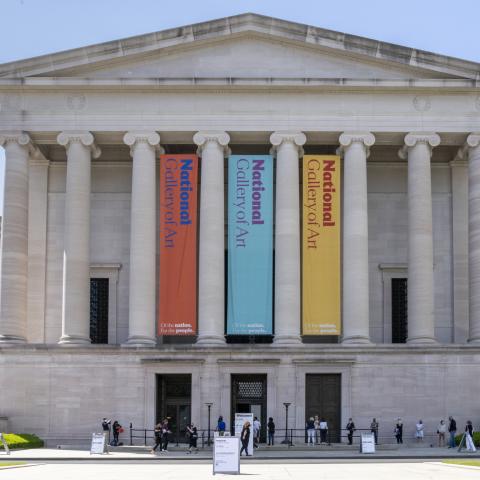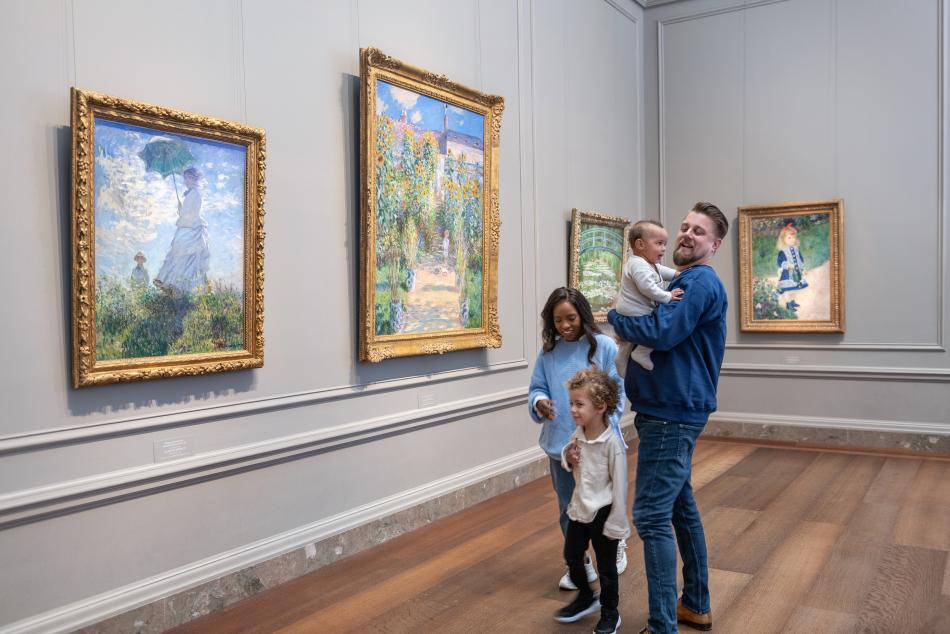A Young Man Seated at a Table (possibly Govaert Flinck)
c. 1660
Rembrandt van Rijn
Artist, Dutch, 1606 - 1669
After learning the fundamentals of drawing and painting in his native Leiden, Rembrandt van Rijn went to Amsterdam in 1624 to study for six months with Pieter Lastman (1583–1633), a famous history painter. Upon completion of his training Rembrandt returned to Leiden. Around 1632 he moved to Amsterdam, quickly establishing himself as the town’s leading artist, specializing in history paintings and portraiture. He received many commissions and attracted a number of students who came to learn his method of painting.
This painting of a stylish young man is one of Rembrandt's most sympathetic late portraits. The sitter's handsome features and gentle expression, framed by the long locks of his hair, suggest warmth and sensitivity. At the same time, the understated simplicity of his dress — from the plain white collar, left open at the neck, to his black costume and hat — reinforces the sense of self-assurance so evident in the pose. The name of the sitter is not known, and the signature and date are extremely difficult to decipher. Stylistically, a date of about 1660 seems correct for this work.
This portrait may represent the artist Govaert Flinck (1615–1660), as it resembles an engraved portrait of Flinck made by an unknown artist. At the time of his sudden death in February 1660, Flinck was at the height of his fame. Following his studies with Rembrandt in the mid-1630s, he became a successful portrait and history painter in a style that was admired by important civic and private patrons in both Amsterdam and his native Germany. Flinck was wealthy and well connected, and had a remarkable art collection. The emotional warmth of this portrait suggests that the contacts between the sitter and Rembrandt were personal as well as professional.

West Building Main Floor, Gallery 48
Artwork overview
-
Medium
oil on canvas
-
Credit Line
-
Dimensions
overall: 109.9 x 89.5 cm (43 1/4 x 35 1/4 in.)
framed: 149.2 x 131.1 x 17.8 cm (58 3/4 x 51 5/8 x 7 in.) -
Accession Number
1937.1.77
More About this Artwork
Artwork history & notes
Provenance
Possibly acquired between 1768 and 1772 by Gustaf Adolf Sparre [1746-1794], Sahlgren-Sparre Palace, Göteborg, and, after 1775, Kulla Gunnarstorp Castle, near Helsingborg, Sweden; by inheritance to his wife, Elisabet Sofia Amalia Beata Sparre [née Ramel, 1753-1830], Kulla Gunnarstorp Castle; by inheritance to her grandson, Gustaf Adolf Frederik De la Gardie [1800-1833], Kulla Gunnarstorp Castle; by inheritance to his father, Jacob Gustaf De la Gardie [1768-1842], Kulla Gunnarstorp Castle; sold a few years after 1837 [when De Geer had purchased Kulla Gunnarstorp Castle] with the entire Sparre collection to Carl De Geer of Leustra [1781-1861]; placed 1855 into a family trust under care of his granddaughter, Elizabeth Wachtmeister [née von Platen, 1834-1918], Castle Wanås, near Kristianstad, Sweden;[1] sold 1926 by the Wachtmeister Trust to (Duveen Brothers, Inc., London, New York, and Paris); sold December 1926 to Andrew W. Mellon, Pittsburgh and Washington; deeded 28 December 1934 to The A.W. Mellon Educational and Charitable Trust, Pittsburgh; gift 1937 to NGA.
[1] This possible provenance and the preceding chain of ownership are outlined in Ben P. J. Broos et al., Great Dutch Paintings from America, The Hague and Zwolle, 1990: 387, 390. For information about the Sparre collection, see Ingmar Hasselgren, Konstsamlaren Gustaf Adolf Sparre, 1746-1794: hans studieresa, va°ning och konstsamling i Go¨teborg. Ph.D. diss., University of Göteborg, 1974. The painting was first published in 1884, when it was “discovered” in the Wachtmeister collection by Olof Granberg; see his article: "Drei unbekannte Gemälde von Rembrandt," Zeitschrift für Bildende Kunst 19 (1884): 30-32.
Associated Names
Exhibition History
1893
Utställningen af äldre Mästares taflor ur Svenska privatsamlinger, Bukowskis, Stockholm, 1893, no. 161.
1929
Exhibition of Dutch Art 1450-1900, Royal Academy of Arts, London, 1929, no. 83.
1935
Loan Exhibition of Paintings, Drawings and Etchings by Rembrandt and His Circle, The Art Institute of Chicago, 1935-1936, no. 7.
Rembrandt Tentoonstelling, Rijksmuseum, Amsterdam, 1935, no. 29.
1939
Masterworks of Five Centuries, Golden Gate International Exposition, San Francisco, 1939, no. 88a, repro.
1969
Rembrandt in the National Gallery of Art [Commemorating the Tercentenary of the Artist's Death], National Gallery of Art, Washington, D.C., 1969, no. 20, repro.
1976
Chefs-d'oeuvre de musées des États-Unis: de Giorgione à Picasso, Musée Marmottan, Paris, October-December 1976, no. 17, repro. (organized by the Armand Hammer Foundation).
Zapadnoevropeiskaia i Amerikanskaia zhivopis is muzeev ssha [West European and American Painting from the Museums of USA], State Hermitage Museum, Leningrad; State Pushkin Museum, Moscow; State Museums, Kiev and Minsk, 1976, unpaginated and unnumbered catalogue.
1990
Great Dutch Paintings from America, Mauritshuis, The Hague; The Fine Arts Museums of San Francisco, M. H. de Young Memorial Museum, 1990-1991, no. 53, color repro.
1997
Rembrandt: A Genius and His Impact, National Gallery of Victoria, Melbourne; National Gallery of Australia, Canberra, 1997-1998, no. 19, repro.
2002
Rembrandt Rembrandt, Kyoto National Museum; Städelsches Kunstinstitut Frankfurt am Main, 2002-2003, no. 39, repro.
2003
Loan for display with permanent collection, Städelsches Kunstinstitut und Städtische Galerie, Frankfurt am Main, 2003-2004.
2011
Rembrandt in America, North Carolina Museum of Art, Raleigh; Cleveland Museum of Art; Minneapolis Institute of Arts, 2011-2012, no. 36, pl. 35.
Bibliography
1884
Granberg, Olof. "Drei unbekannte Gemälde von Rembrandt." Zeitschrift für Bildende Kunst 19 (1884): 30-32.
1885
Granberg, Olof. Sveriges privata tafvelsamlingar. Stockholm, 1885: 3, no. 2.
1886
Granberg, Olof. Catalogue raisonné de tableaux anciens inconnus jusqu'ici dans les collections privées de la Suède. Stockholm, 1886: 27, no. 49.
1892
"Rembrandt tafla." Ny Illustrerad Tidning 28 (1892): 311, no. 38.
1893
Michel, Émile. Rembrandt: Sa vie, son oeuvre et son temps. Paris, 1893: 568.
Granberg, Olof. Katalog ofver Utställningen af alder Mästares taflor ur Svenska privatsamlinger. Stockholm, 1893: no. 81.
1894
Michel, Émile. Rembrandt: His Life, His Work, and His Time. 2 vols. Translated by Florence Simmonds. New York, 1894: 2:247.
1895
Göthe, Georg. Tafvelsamlingen på Wanås. Stockholm, 1895: 24, no. 53.
1897
Bode, Wilhelm von, and Cornelis Hofstede de Groot. The Complete Work of Rembrandt. 8 vols. Translated by Florence Simmonds. Paris, 1897-1906: 7:3, 4, 38, no. 488, repro.
1899
Bell, Malcolm. Rembrandt van Rijn and His Work. London, 1899: 183.
1904
Rosenberg, Adolf. Rembrandt: des Meisters Gemälde. Klassiker der Kunst in Gesamtausgaben 2. Stuttgart, 1904: 241, repro.
1906
Rosenberg, Adolf. Rembrandt, des Meisters Gemälde. Klassiker der Kunst in Gesamtausgaben 2. 2nd ed. Stuttgart, 1906: repro. 370, 405.
Wurzbach, Alfred von. Niederlandisches Kunstler-Lexikon. 3 vols. Vienna, 1906-1911: 2(1910):411.
1907
Hofstede de Groot, Cornelis. A Catalogue Raisonné of the Works of the Most Eminent Dutch Painters of the Seventeenth Century. 8 vols. Translated by Edward G. Hawke. London, 1907-1927: 6(1916):366, no. 784.
Hofstede de Groot, Cornelis. Beschreibendes und kritisches Verzeichnis der Werke der hervorragendsten holländischen Maler des XVII. Jahrhunderts. 10 vols. Esslingen and Paris, 1907-1928: 6(1915):327-328, no. 784.
Rosenberg, Adolf. The Work of Rembrandt, reproduced in over five hundred illustrations. Classics in Art 2. New York, 1907: 370, repro.
Bell, Malcolm. Rembrandt van Rijn. The great masters in painting and sculpture. London, 1907: 154.
1908
Rosenberg, Adolf. Rembrandt, des Meisters Gemälde. Klassiker der Kunst in Gesamtausgaben 2. 3rd ed. Stuttgart and Berlin, 1908: repro. 500, 564.
1909
Rosenberg, Adolf. Rembrandt: Des Meisters Gemälde. Edited by Wilhelm R. Valentiner. Klassiker der Kunst in Gesamtausgaben 2. Stuttgart and Leipzig, 1909: repro. 500, 564.
1910
Hahr, R. Svenska slott och herresäten. Stockholm, 1910: 83, repro.
1911
Granberg, Olof. Inventaire général des trésors d'art, peintures & sculptures...en Suède. 3 vols. Stockholm, 1911-1913: 1(1911):125, no. 536, repro. no. 56.
1913
Rosenberg, Adolf. The Work of Rembrandt, reproduced in over five hundred illustrations. Classics in Art 2. Edited by Wilhelm R. Valentiner. 2nd ed. New York, 1913: repro.
1921
Rosenberg, Adolf. The Work of Rembrandt. Edited by Wilhelm R. Valentiner. Classics in Art 2. 3rd ed. New York, 1921: repro.
1923
Meldrum, David S. Rembrandt’s Painting, with an Essay on His Life and Work. New York, 1923: 203, pl. 431.
1926
"Ein Rembrandt von Schweden nach Amerika verkauft." Der Cicerone 18 (1926): 207–208.
1928
"America Lends Dutch Paintings to London Show." Art News (29 December 1928): 1, 12, repro.
1929
Witt, Robert Clermont. Exhibition of Dutch art, 1450-1900. Exh. cat. Royal Academy of Arts, London, 1929: no. 83.
Bauch, Kurt. "Ausstellung holländischer Kunst von 1450–1900 in London." Zeitschrift für Bildende Kunst 63 (1929): 3.
Gibson, William. "The Dutch Exhibition at Burlington House." Apollo 9 (January 1929): 1-12, repro.
Puyvelde, Leo van. "Hollandsche Kunst te London." Onze Kunst 46 (May 1929): 158.
Rutter, Frank. "Notes from Abroad." International Studio 92 (1929): 66.
1930
Valentiner, Wilhelm R. "Important Rembrandts in American Collections." Art News 28, no. 30 (26 April 1930): 2-4, repro.
1931
Valentiner, Wilhelm R. Rembrandt Paintings in America. New York, 1931: no. 159, repro.
1935
"L’Exposition Rembrandt à Amsterdam." Amour de l’art 16 (1935): 271, repro.
Benesch, Otto. Rembrandt: Werk und Forschung. Vienna, 1935: 67 (reprint ed., Lucerne, 1970).
Rich, Daniel Catton. "Rembrandt Remains." Parnassus 7 (October 1935): 2-5, repro.
Schmidt-Degener, Frederik. Rembrandt Tentoonstelling, ter herdenking van de plechtige opening van het Rijksmuseum. Exh. cat. Rijksmuseum, Amsterdam, 1935: 60-61, no. 29.
Bredius, Abraham. Rembrandt Schilderijen, 630 Afbeeldingen. Utrecht, 1935: no. 312, repro.
Rich, Daniel Catton. Loan exhibition of paintings, drawings and etchings by Rembrandt and his circle. Exh. cat. Art Institute of Chicago, 1935: 18, no. 7.
Bredius, Abraham. Rembrandt Gemälde, 630 Abbildungen. Vienna, 1935: no. 312, repro.
1936
Bredius, Abraham. The Paintings of Rembrandt. New York, 1936: no. 312, repro.
1937
"A National Gallery for America." The Burlington Magazine 70 (March 1937): 143, repro.
Cortissoz, Royal. An Introduction to the Mellon Collection. Boston, 1937: 39, repro.
1939
Golden Gate International Exposition. Masterworks of Five Centuries. Exh. cat. Golden Gate International Exposition, San Francisco, 1939: no. 88a, repro.
1941
National Gallery of Art. Preliminary Catalogue of Paintings and Sculpture. Washington, 1941: 165, no. 77.
Duveen Brothers. Duveen Pictures in Public Collections of America. New York, 1941: no. 203, repro., as A Youing Man at a Table.
1942
Book of Illustrations. National Gallery of Art, Washington, 1942: 240, repro. 31.
Bredius, Abraham. The Paintings of Rembrandt. 2 vols. Translated by John Byam Shaw. Oxford, 1942: 1:18, no. 312, repro.
1943
Benesch, Otto. "The Rembrandt Paintings in the National Gallery of Art." The Art Quarterly 6, no. 1 (Winter 1943): 30 fig. 10, 31.
1949
National Gallery of Art. Paintings and Sculpture from the Mellon Collection. Washington, 1949 (reprinted 1953 and 1958): 88, repro.
1952
Behrman, Samuel N. Duveen. New York, 1952: 28.
1956
Knuttel, Gerhardus. Rembrandt: de meester en zijn werk. Amsterdam, 1956: 219, 273.
1959
Bauch, Kurt. "A Portrait of Rembrandt’s Last Period." The Burlington Magazine 101 (May 1959): 105-106, repro.
1961
Porkay, Martin. Der Drost-Lose Rembrandt. Munich, 1961: 10-15, 28-29, figs. II, IV.
1963
Porkay, Martin. Die Abenteuer zweier unechter Rembrandts. Munich, 1963: 13, 15, 26-27, fig. II.
Walker, John. National Gallery of Art, Washington, D.C. New York, 1963 (reprinted 1964 in French, German, and Spanish): 314, repro.
1965
National Gallery of Art. Summary Catalogue of European Paintings and Sculpture. Washington, 1965: 109.
1966
Bauch, Kurt. Rembrandt Gemälde. Berlin, 1966: 23, no. 439, repro.
1968
Gerson, Horst. Rembrandt Paintings. Amsterdam, 1968: color repro. 153, repro. 446, no. 405, 504.
National Gallery of Art. European Paintings and Sculpture, Illustrations. Washington, 1968: 98, repro.
1969
Bredius, Abraham. Rembrandt: The Complete Edition of the Paintings. Revised by Horst Gerson. 3rd ed. London, 1969: repro. 238, 574, no. 312.
National Gallery of Art. Rembrandt in the National Gallery of Art: Commemorating the tercentenary of the artist's death. Exh. cat. National Gallery of Art, Washington, 1969: 7, 30, no. 20, repro.
1970
Benesch, Otto. Rembrandt: Werk und Forschung. Reprint of 1935 ed. Lucerne, 1970: 67.
1972
Behrman, Samuel N. Duveen. 2nd ed. London, 1972: 25.
1974
Hasselgren, Ingmar."Konstsamlaren Gustaf Adolf Sparre. 1746–1794: hans studieresa, våning och konstsamling Göteborg." Ph.D. dissertation, University of Göteborg, 1974: 111, 127, 131, 195, 198, no. G 53, repro.
1975
National Gallery of Art. European paintings: An Illustrated Summary Catalogue. Washington, 1975: 284-285, repro.
1976
Daulte, François. Chefs-d'oeuvre de musées des États-Unis: de Giorgione à Picasso. Exh. cat. Musée Marmottan, Paris, 1976: no. 17, repro.
Bessonova, Marina A. Zapadnoevropeiskaia i Amerikanskaia zhivopis is muzeev ssha [West European and American Painting from the Museums of USA]. Exh. cat. State Hermitage Museum, Leningrad; Pushkin Museum, Moscow; State Museum Kiev; State Museum Minsk. Moscow, 1976: unpaginated and unnumbered.
1977
Bolten, J., and H. Bolten-Rempt. The Hidden Rembrandt. Translated by Danielle Adkinson. Milan and Chicago, 1977: 202, no. 549, repro.
1984
Schwartz, Gary. Rembrandt: Zijn leven, zijn schilderijen. Maarssen, 1984: 339, no. 396, repro.
Walker, John. National Gallery of Art, Washington. Rev. ed. New York, 1984: 279, no. 363, color repro., as by Rembrandt van Ryn.
1985
National Gallery of Art. European Paintings: An Illustrated Catalogue. Washington, 1985: 330, repro.
Schwartz, Gary. Rembrandt: His Life, His Paintings. New York, 1985: 339, no. 396, repro.
1986
Guillaud, Jacqueline, and Maurice Guillaud. Rembrandt: das Bild des Menschen. Translated by Renate Renner. Stuttgart, 1986: 362, no. 416, repro.
Guillaud, Jacqueline, and Maurice Guillaud. Rembrandt, the human form and spirit. Translated by Suzanne Boorsch et al. New York, 1986: no. 416, repro.
Tümpel, Christian. Rembrandt. Translated by Jacques and Jean Duvernet, Léon Karlson, and Patrick Grilli. Paris, 1986: repro. 326, 413, no. 217.
Sutton, Peter C. A Guide to Dutch Art in America. Washington and Grand Rapids, 1986: 314.
1990
Broos, Ben P. J., ed. Great Dutch Paintings from America. Exh. cat. Royal Picture Gallery Mauritshuis, The Hague; Fine Arts Museums of San Francisco. The Hague and Zwolle, 1990: 51, 387-393, no. 53, color repro. 388.
1995
Wheelock, Arthur K., Jr. Dutch Paintings of the Seventeenth Century. The Collections of the National Gallery of Art Systematic Catalogue. Washington, 1995: 265-270, color repro. 267.
1997
Blankert, Albert. Rembrandt: A Genius and his Impact. Exh. cat. National Gallery of Victoria, Melbourne; National Gallery of Australia, Canberra. Zwolle, 1997: 151-153, no. 19, repro.
2003
Giltaij, Jeroen. Rembrandt Rembrandt. Exh. cat. National Museum, Kyoto; Städelsches Kunstinstitut und Städtische Galerie, Frankfurt am Main. Wolfrathausen, 2003: 202-205, no. 39, repro.
2006
Rønberg, Lene Bøgh, and Eva de la Fuente Pedersen. Rembrandt?: The Master and His Workshop. Exh. cat. Statens Museum for Kunst, Copenhagen, 2006: 46, fig. 9.
2011
Keyes, George S., Tom Rassieur, and Dennis P. Weller. Rembrandt in America: collecting and connoisseurship. Exh. cat. North Carolina Museum of Art, Raleigh; Cleveland Museum of Art; Minneapolis Institute of Arts. New York, 2011: 131, 134, 192, no. 36.
Inscriptions
center right: Rembrandt 166[?]
Wikidata ID
Q20177567





